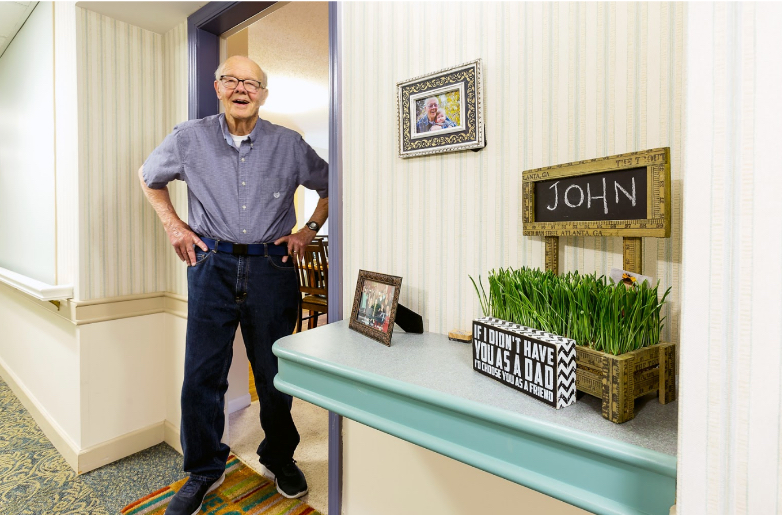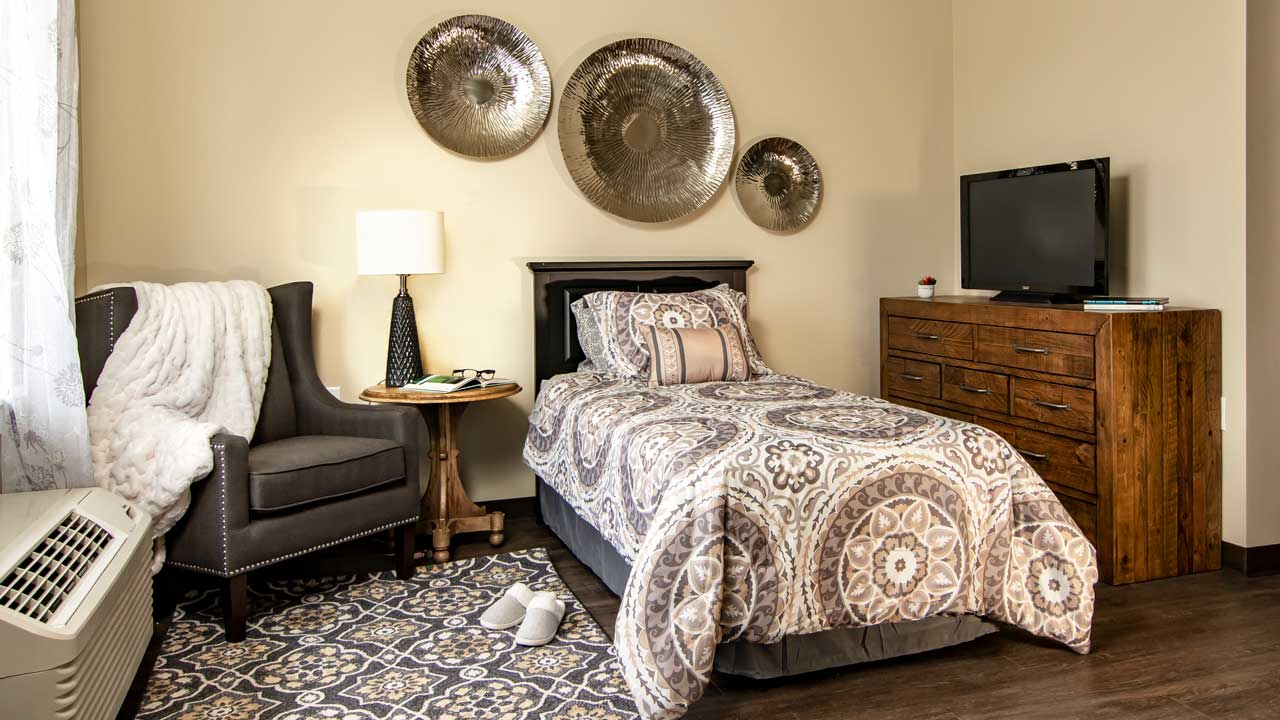Personalized Memory Care for Seniors in a Supportive Environment
Personalized Memory Care for Seniors in a Supportive Environment
Blog Article
Everything About Memory Care Solutions: Why Small Memory Treatment Houses Are a Terrific Choice
Memory care services play a vital function in sustaining individuals with Alzheimer's and mental deterioration. Little memory treatment homes attract attention for their personalized method and intimate setting. With lower staff-to-resident ratios, these homes promote more powerful links and tailored care. Residents take advantage of enhanced social communications and a risk-free setting. As family members discover alternatives, understanding the unique advantages of tiny memory treatment homes ends up being crucial. What aspects should be thought about when selecting the best home?
Recognizing Memory Care Provider
While several may know with basic elderly treatment choices, recognizing memory treatment solutions is important for family members facing the obstacles of cognitive decline. Memory care particularly accommodates people with conditions such as Alzheimer's illness and other types of mental deterioration. These services supply an organized atmosphere that concentrates on boosting the quality of life for residents via specialized care and support.Memory treatment centers are designed to assure safety and security and protection, usually including secured atmospheres to avoid roaming. Trained employee are offered all the time to assist with daily activities, medicine monitoring, and individual care. In addition, memory care programs often include cognitive excitement tasks, customized to engage residents and promote mental wellness. Family members can gain from understanding these solutions, as they make it possible for informed decisions regarding their loved ones' care, making certain that their certain requirements and choices are attended to in a thoughtful and encouraging way.
The Advantages of Small Memory Treatment Residences
Tiny memory treatment homes supply unique benefits that can considerably enhance the high quality of life for homeowners with cognitive problems. One significant benefit is the intimate setting, which enables for customized communications among personnel and homeowners. This smaller sized setting cultivates purposeful partnerships, reducing feelings of seclusion and anxiousness typically experienced by individuals with memory issues.Additionally, the lower staff-to-resident ratio in small memory treatment homes enables caretakers to provide even more mindful guidance and support. This strategy not just enhances safety and security however likewise promotes a complacency for the residents.Moreover, little memory care homes can adjust rapidly to the special demands and preferences of each resident, enabling a much more homey environment. Such an atmosphere can motivate social engagement and engagement in activities, inevitably enriching the daily experiences of those dealing with cognitive impairments.
Personalized Care Program for Citizens
Customized treatment strategies are important in memory treatment homes, as they accommodate the one-of-a-kind needs and choices of each resident. These plans begin with detailed evaluations conducted by experienced specialists, who examine cognitive abilities, medical background, and individual rate of interests. This customized method guarantees that care is not just reliable however additionally respectful of each individual's dignity and autonomy.Moreover, individualized care strategies are adaptable, allowing changes as locals' needs evolve gradually. This flexibility fosters a feeling of security and familiarity, which is essential for individuals dealing with memory obstacles. Caregivers are trained to carry out these strategies continually, supplying assistance that aligns with the citizens' regimens and preferences.Ultimately, personalized care strategies boost the lifestyle for residents by promoting freedom, well-being, and interaction, making them a basic aspect of memory care services in little memory treatment homes.
Developing a Home-Like Environment
Developing a home-like atmosphere is vital for fostering convenience and knowledge in memory treatment setups, as it significantly affects citizens' psychological wellness. Tiny memory care homes frequently focus on individualized touches, such as cozy shade schemes, family photos, and familiar furniture arrangements, which assist residents really feel a lot more secure. Including aspects reminiscent of a conventional home, like cozy space and common locations, urges a sense of belonging.Moreover, making use of all-natural light and exterior rooms can enhance the environment, advertising leisure and peace. Personnel play a substantial duty in maintaining this setting by involving with citizens in a compassionate way, treating them like household. Routine activities, such as cooking or horticulture, can also add to a home-like feel, supplying chances for locals to participate in purposeful experiences. On the whole, creating a nurturing atmosphere supports cognitive function and psychological security, making it an essential facet of memory care services.
Enhanced Social Communication and Neighborhood
Enhanced social communication and neighborhood are crucial components of memory care solutions. By promoting individualized social engagement and producing a family-like atmosphere, these solutions advertise significant connections amongst citizens. Team tasks and occasions better motivate involvement, helping people really feel more included and sustained.
Personalized Social Engagement
While social communication is internet important for general health, many individuals with memory problems usually struggle to engage meaningfully with others. Individualized social interaction in memory care homes addresses this difficulty by creating customized activities that satisfy residents' unique rate of visite site interests and capacities. By concentrating on individual preferences, caretakers can cultivate connections that reverberate deeply with everyone. Tasks such as art therapy, songs sessions, and assisted discussions advertise cognitive stimulation and psychological expression. Additionally, little team settings encourage camaraderie and permit more intimate interactions, boosting sensations of belonging. This approach not just fights sensations of isolation however likewise encourages citizens to maintain a feeling of identification, inevitably adding to enhanced psychological health and quality of life.
Family-like Ambience
In a memory treatment setup, fostering a family-like ambience substantially improves social interaction and builds a sense of community among residents. Smaller sized memory treatment homes often focus on intimate environments, permitting locals to develop closer connections with one another and employee. This nurturing atmosphere advertises count on, which is important for people with memory disabilities. Locals are more most likely to engage in discussions and share experiences, developing an encouraging network that eases sensations of loneliness. The experience of shared spaces and routines adds to a sense of belonging, even more urging social interaction (personalized memory care). In such setups, emotional bonds thrive, leading to enhanced general health and a better of life for locals as they browse their everyday experiences with each other
Group Activities and Occasions

Security and Protection Attributes in Tiny Residences
Several small homes designed for memory treatment include necessary safety and security and safety and security attributes to ensure the well-being of locals. These homes usually utilize safe and secure access and departure indicate stop straying, a common problem among people with memory impairments. Furthermore, monitoring systems and alarm system devices boost tracking, guaranteeing that personnel can immediately react to any kind of unusual activities.Interior designs are tailored for security, with minimized threats such as sharp corners and clutter-free pathways. Handrails and non-slip flooring are usually mounted to lower the danger of drops. Employee are learnt emergency protocols, ensuring they are prepared for different situations.Moreover, customized treatment strategies may include assessment of individual safety requirements, offering tailored services for each citizen. Generally, these safety and security and protection attributes produce a caring setting where locals can prosper while preserving their self-respect and self-reliance.
How to Choose the Right Memory Care Home
Exactly how can family members guarantee they pick More hints one of the most appropriate memory care home for their enjoyed ones? The decision needs careful factor to consider of several variables. Initially, family members need to review the center's staff certifications and training, ensuring that caregivers are experienced in handling memory-related problems. Next off, it's crucial to analyze the home's setting, concentrating on safety features and whether it promotes a sense of neighborhood and belonging. Visiting the facility can supply understanding right into everyday activities and the social ambience, which are crucial for psychological excitement and emotional well-being. Additionally, households must ask about the treatment strategies supplied, ensuring they are customized to individual needs. Ultimately, thinking about the home's location and availability for household check outs can add to a smoother change. By resolving these aspects, family members can make an informed choice that prioritizes their loved one's comfort and top quality of life in a memory treatment setting.
Often Asked Questions
What Credentials Should Staff Members in Memory Treatment Residences Have?
Personnel in memory care homes need to possess appropriate qualifications, experience in dementia care, strong interaction skills, and compassion. Continuous training in behavioral monitoring and therapeutic treatments boosts their ability to sustain citizens successfully.
How Do Memory Treatment Services Differ From Conventional Assisted Living?
Memory care services concentrate especially on individuals with memory problems, supplying specific assistance and organized environments. On the other hand, traditional assisted living uses basic help with day-to-day tasks, doing not have the customized technique essential for those with cognitive challenges.
What Sorts of Tasks Are Offered in Memory Care Residences?
Memory treatment homes typically use a variety of activities developed to engage citizens. Typical options include art therapy, music sessions, cognitive video games, workouts, gardening, and social occasions, all intended at boosting wellness and cognitive feature.
Can Citizens Bring Their Own Valuables to Memory Treatment Residences?
Homeowners can typically bring their very own valuables to memory treatment homes, allowing them to personalize their space - personalized memory care. This technique helps develop a familiar setting, advertising convenience and a sense of identification for the people

How Are Family Participants Associated With the Care Refine?
Member of the family play a vital function in the treatment procedure, often participating in decision-making, going to treatment conferences, and giving emotional support. Their participation fosters a collective atmosphere, improving the homeowner's general health and lifestyle. While several might be acquainted with general elderly care choices, comprehending memory care services is necessary for families facing the challenges of cognitive decrease. These solutions supply an organized atmosphere that concentrates on enhancing the high quality of life for homeowners through specialized treatment and support.Memory treatment facilities are made to assure safety and security and safety and security, commonly including secured atmospheres to stop roaming. Customized care strategies are crucial in memory care homes, as they cater to the special needs and preferences of each homeowner. Personnel participants in memory treatment homes ought to possess relevant accreditations, experience in mental deterioration care, strong communication skills, and concern. Memory care solutions focus especially on individuals with memory impairments, giving specific assistance and organized settings.
Report this page